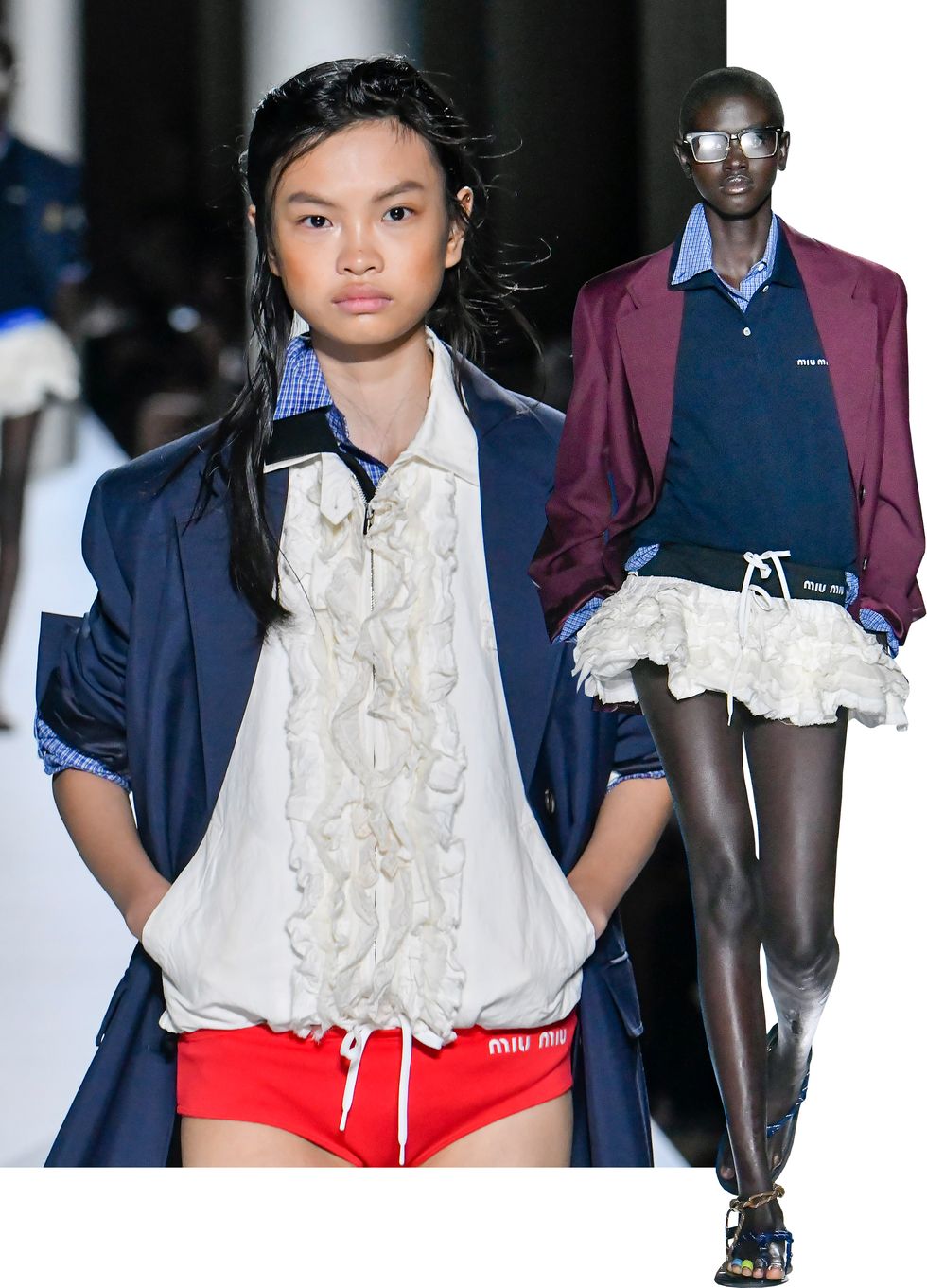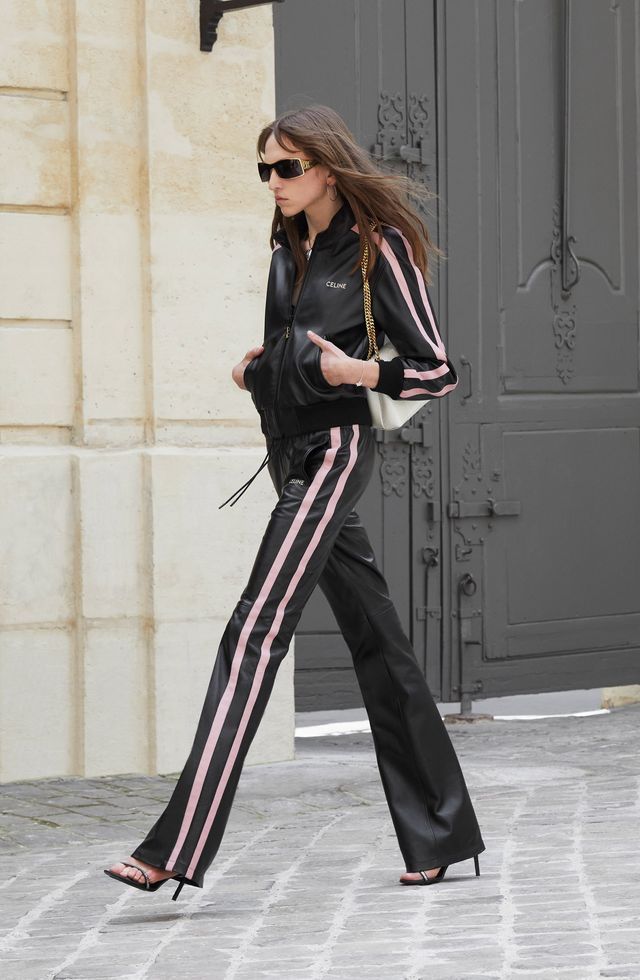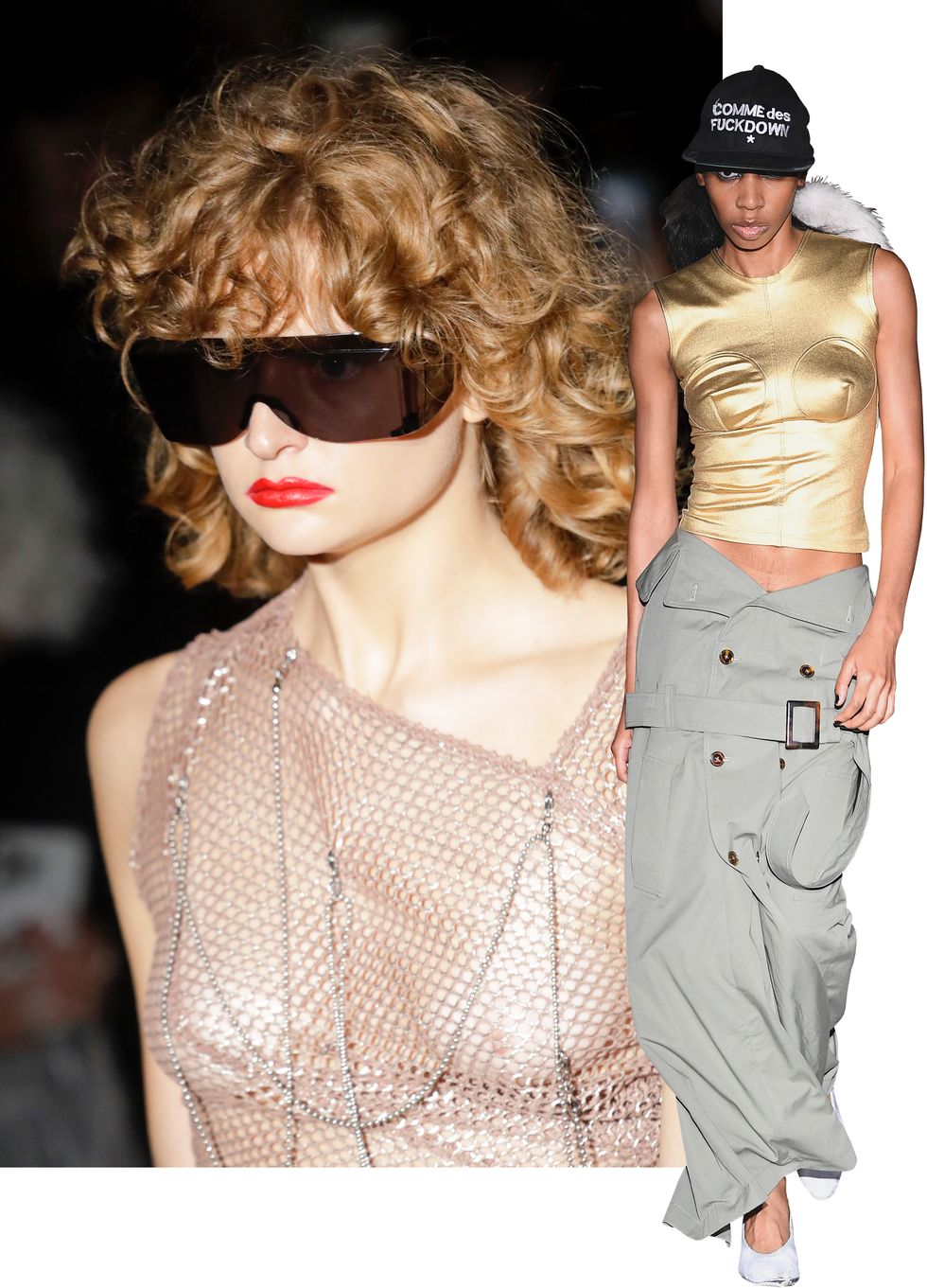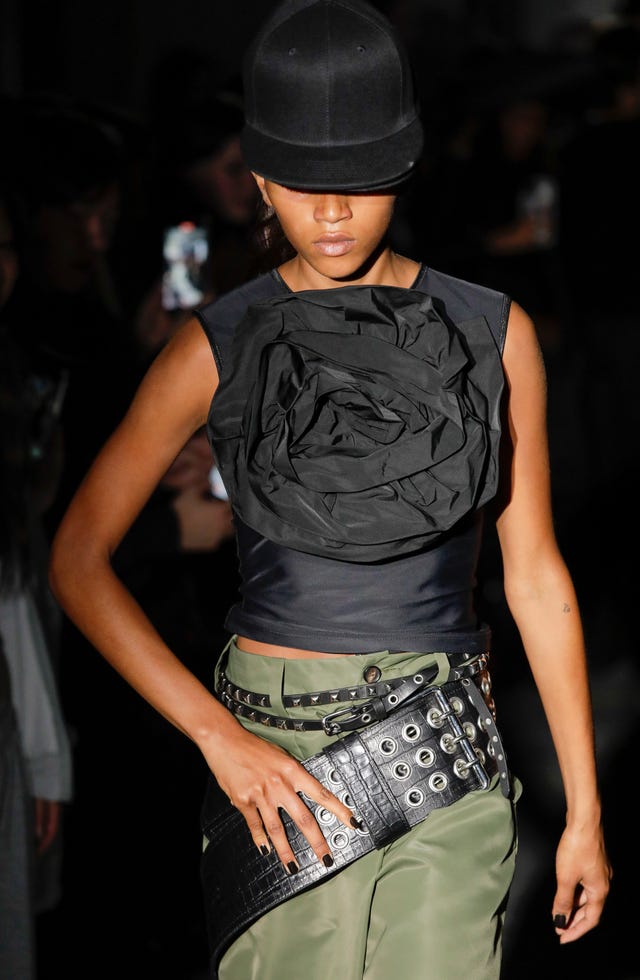It finally happened: All over the spring 2024 runways, there were polos with popped collars, leggings, and, most of all, belts on every single thing, every single way, from Miu Miu to Ralph Lauren.
Maybe you remember the heyday of this style. It’s so oddly specific not just of Y2K, but of early to mid-2000s mall culture that millennials will remember all too well (think: Hollister, Abercrombie, and American Eagle). This isn’t the blingy fashion we’ve seen decked out in Juicy Couture logos, bright colors, and faux furs; it’s slightly ironic and less glam than fashion revivals of the past, replete with greasy hair, glasses, and fashion that is full of down-to-earth references. It’s not indie sleaze, and it’s not twee. It’s real-world fashion that real people were wearing. And its return isn’t just happening on the runway either. American mall brands like Banana Republic are having comebacks with newfound fans and endless buzz everywhere you look. Celebrities like Bella Hadid are wearing vintage Guess and Polo by Ralph Lauren. The Met has a continuous collaboration with the skater-surfer mall brand of yore, PacSun. Balenciaga recently presented its fall 2024 collection as a tribute to mid-2000s L.A.-influenced mall culture: tracksuits, Ugg-style boots, and oversized hoodies permeated the runway.
The mall look was perhaps best seen at Miu Miu’s spring 2024 show, where models wore the aforementioned polos, baggy blazers, Bermuda shorts, and flat sandals. Elements of messiness and juxtaposed carefreeness were definitively there. Some models carried bags spilling over with an extra pair of shoes and a change of clothes—very after-school-activity-esque. There were layered tops stacked underneath shirts and sweaters and a multiverse of waistbands. It was all very 2007—the era when wearing a tank top with faux lace trim under multiple layers was normal. Miu Miu’s collection was all about “individual, expressed through both fashion and cast,” according to the brand’s show notes. “In an ever-changing world, beauty must echo the complexity of our era: this collection searches for a reflective definition, a reactive address of beauty for modern times. Revisiting past styles emphasizes the importance and meaning of histories—they are embedded with the memories of the values of past times, reevaluated.” In other words, your old wardrobe.
Leggings in particular were rampant on the runways as of late. The trend kicked off last season, when Ferragamo, Saint Laurent, Blumarine, and others showed different versions of the humble underpinning on the runway. Celine’s summer 2024 collection, shot at the Bibliothèque Nationale de France, showed toned-down tracksuits with sherpa footwear. Carolina Herrera gave us cropped polos and twinsets. And LaQuan Smith, Khaite, and Brandon Maxwell accessorized models with belts—the unofficial mascot of the mall era. Newly named Gucci creative director Sabato De Sarno delivered hoodies as the answer to the brand’s new look.
Interestingly, there’s something distinctly American about the aesthetic. “In the aughts, so-called mall fashions prevailed in the mass market,” says Abby Lillethun, a professor of fashion cultures and histories at Montclair State University. “Brands like Abercrombie, Aeropostale, and Juicy Couture—all of them sold well to tourists taking advantage of the exchange rates, which propelled global popularity.” She defines the runway’s mall culture redux as “a mashup of historicism, incorporating style elements from past fashion into current design. “
In an era where the mall feels like a lost memory—a place where shopping was a social activity and style cliques were born based on brands alone—this aesthetic is so deeply rooted in nostalgia. “As the world continues to shift into ever-frightening tumult, the true tenets we’re seeking as a collective are comfort and community; so fashion’s shift from an obsession with crystal-bling laden aughts nostalgia to ‘safe’ mall culture makes perfect sense,” says trend forecaster Jessica Richards. “It’s a reprieve—even if just through dressing—to a time with more genuine connectivity and ease, one less about the expression of the individual and more about the collective hang. This era represents a time when meet-ups were planned, routine, and implored to be IRL, versus online. Even board games reminded us that it’s cool at the mall.”
Perhaps the community behind the biggest style staples of mall fashion’s greatest era is what’s behind the rise on the recent runways. After all, even if we’re all shopping at the same places online, there’s virtually no community aspect of buying clothing today—unless you’re shopping a closet sale IRL. And if you weren’t at the mall in the mid-2000s, you were likely finding your own community on Tumblr. Vaquera even took a stab at the social networking site’s fashion aesthetic for its spring 2024 show, dressing models in big sunglasses and the once-iconic “Commes des Fuckdown” slogan cap. Streetwear designer Russ Karablin designed the graphic slogan in the early 2000s, but it reemerged with cult popularity in 2012 when A$AP Mob wore a beanie with the phrase. The play on Comme Des Garçons’ logo is so specifically linked to this era too, when collective streetwear flourished. Vaquera’s big belts, logo tees, and hoodies also felt particularly mall-worthy. The show notes were written with only one statement: “Does it really matter?”
In a weirdly wonderful way, mall fashion does matter and feels like the kind of community fashion needs right now, even if it’s not literal. “Perhaps this also will inspire a return to some of the niche styling direction signaling community at that time: coordinated dressing in friend groups, colors to signify the day of the week, shared or ‘traveling’ garments passed amongst friends,” Richards adds. “For millennials, especially those in the older set, the references we are currently seeing are a reminder of a much simpler era; sans excessive screen time and digital exhaustion, when mobile phones and computers were still a bit novel versus necessary. For Gen Z, the nostalgia is their interpretation based on Google searches, thrifted garments, and re-watches of Mean Girls.”
At the tail end of 2023, maybe there’s some comfort in dressing like everyone else, even if it’s done in a way that feels like it’s cosplaying our former selves. It’s basic, but it’s not high-end minimalism, and it’s not quiet luxury either. It’s somehow extremely soothing and non-challenging. It’s dressing that doesn’t really require you to think. Unless you want to. Leggings, in their height of mall culture fashion, before we reached peak athleisure, felt like a unanimous must-have that also served as a security blanket of sorts. Perhaps dressing like our former mall-obsessed selves is the answer to finding solace in fashion—and in life—right now.

Kristen Bateman is a contributing editor at Harper’s Bazaar. Her first fashion article was published in Vogue Italia during her junior year of high school. Since then, she has interned and contributed to WWD, Glamour, Lucky, i-D, Marie Claire and more. She created and writes the #ChicEats column and covers fashion and culture for Bazaar. When not writing, she follows the latest runway collections, dyes her hair to match her mood, and practices her Italian in hopes of scoring 90% off Prada at the Tuscan outlets. She loves vintage shopping, dessert and cats.




